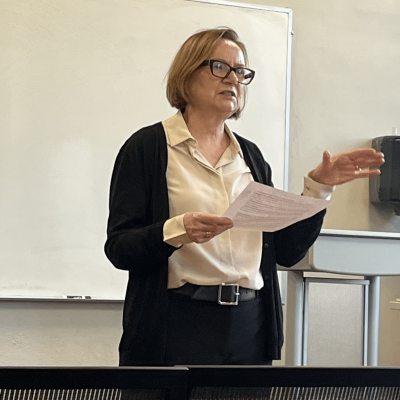Departmental Newsletter: November 2023
Felipe De Brigard has published a book! His new Cambridge Element in Philosophy of Mind surveys research on three central and interrelated issues about the nature of memory and remembering. The first is about the nature of memory as a cognitive faculty. This part discusses different strategies to distinguish memory from other cognitive faculties as well as different proposed taxonomies to differentiate distinct kinds of memory. The second issue concerns what memory does, which is traditionally thought to have a simple answer: remembering. As it turns out, philosophers not only disagree as to how to characterize remembering but also whether the function of memory is indeed to remember. Finally, the third issue is about the nature of what we remember - a question that may refer to the object of our memories but also to their content, with different views disagreeing on how to characterize the relationship between the two.
Wenjin Liu co-organized a conference on ancient philosophy with Mariska Leunissen (UNC). The topic of the conference was "Race, Sex, and Marginalization in Ancient Philosophy." The meeting took place on November 16th and 17th, and - in addition to presentations by the two organizers - it included talks by Marguerite Deslauriers (McGill), Sukaina Hirji (UPenn), Josh Wilburn (Wayne State), and Emily Austin (Wake Forest).
Marguerite Deslauriers (McGill) had a busy visit to Duke! In addition to her presentation at "Race, Sex, and Marginalization in Ancient Philosophy," she also gave a colloquium presentation to the department. Professor Deslauriers' talk, titled "Sexual Differences in Natural Character: the Reception of Aristotle’s Biology in Sixteenth Century Italy," considered the reception of Aristotle’s biological works in several polemical treatises written in the sixteenth century, defending the capacities and virtues of women from misogynist attacks. She argued that the reputation Aristotle has gained as an arch-misogynist was formulated in the responses to misogynist appeals to Aristotle, but that in feminist contributions to the querelle des femmes we also find appeals to his biology for the claim that women are superior in virtue of their physiology. In addition, she aimed to show that the reception of the biology in these works is moralizing: the structures and physiology of the bodies of men and women are held to have moral value and to produce inferior or superior intellectual and moral qualities.
Congratulations to Rachel Gilbert, who completed the first course of Duke University Police Department's Citizens Police Academy. The Academy is designed to help create community understanding of the work of the campus police at Duke, and to build relationships between the community and the police. Rachel successfully completed the faculty and staff version of the course (which involves a few hours a week for 7 weeks) and plans to attend the Alumni Citizens Police Academy next fall. Learn more here!
David Wong participated in the annual et Religio symposium, which brings together Duke students from diverse religious and non-religious backgrounds for an evening of dinner and conversation about ultimate questions. This year, the symposium's topic was "Good, Bad, and God: Do We Need God for Morality?" Participants contemplated what gives weight to our thinking about morality. Do we need God to explain the apparent objectivity that characterizes our discourse about good and bad, or can it be explained on other grounds? David engaged in a moderated conversation with Christian Miller of Wake Forest University. Their conversation was followed by a roundtable discussion where participants dialogued with their friends and peers about whether, and why, we can make true moral judgements.
Cambridge HPS hosted an online discussion of Katherine’s recent work – her book on Du Châtelet and the forthcoming co-authored book with Marius Stan, Philosophical Mechanics in the Age of Reason. Attended by Cambridge and Duke HPS folks along with some of Katherine’s former students, the discussion was lively. Unfortunately, Philosophical Mechanics will not be out in time for the holidays, otherwise it would have been a great stocking filler at a mere $110.00 from OUP.
What can "Jeopardy!" teach the world of philosophy, and vice versa? Walter Sinnott-Armstrong recently hosted nine-time Jeopardy! champion Ben Chan (Assistant Professor of Philosophy at St. Norbert College) for an interactive exploration of what it takes to be successful at the game and what it takes for the game to be successful. Attendants discussed the significance of middlebrow culture, delved into the aesthetics of trivia, and uncovered at least one philosophical secret to victory… all as they played some Jeopardy! together. Walter thanks Jesse Summers, Senior Fellow at the Kenan Institute for Ethics, for making this fun and enlightening event possible.
Ask Tayfun, Or Don’t: The (Unsolicited™) Advice Column

Ben Eva asks Caleb to ask me “how one should dress in order to best manage the wild temperature swings of a North Carolina autumn day”. I am unsure why he wouldn’t just ask me directly. Temperature swings are a bit like mood swings, not least because the weather affects both of them. But Robert Nozick also tells us, confusingly: “A mood is like a weather prediction that could affect the weather.” (The Examined Life, p. 116). Neither aphorism nor Armstrong’s thermometer model of knowledge is likely to help in solving this three-body problem, but I can offer an Azerbaijani proverb instead: “If pensive, one might brainstorm even in a rainstorm—if you have an upset tummy, it won’t matter if it’s sunny.”
Alternatively, I recommend wearing layers.
If you have a question for Tayfun for the next newsletter, please send it to tayfun.gur@duke.edu... though you may get some advice even if you don't.







